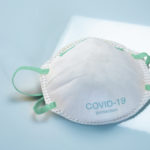 In the early days of the pandemic, amidst all the uncertainty, one thing was for sure: N95 masks – the personal protective respiratory devices that filter out viruses, bacteria, and wildfire smoke – were in short supply. So when materials scientists Jeff Urban and Peter Hosemann heard that a local HMO needed advice on N95 alternatives, they immediately knew what to do: Make a better mask.
In the early days of the pandemic, amidst all the uncertainty, one thing was for sure: N95 masks – the personal protective respiratory devices that filter out viruses, bacteria, and wildfire smoke – were in short supply. So when materials scientists Jeff Urban and Peter Hosemann heard that a local HMO needed advice on N95 alternatives, they immediately knew what to do: Make a better mask.
Hosemann got on the phone, and discovered that the HMO’s doctors and supply managers wanted to know what makes an effective antiviral mask, and how they could verify whether the masks they found were actually any good. “It was helpful to learn what their needs were, and how we could fill in and help support their mission,” said Hosemann, who holds titles of faculty scientist in the Materials Sciences Division at Berkeley Lab and Ernest S. Kuh Chair in Engineering at UC Berkeley.
“Fortuitously, Peter and I had just joined forces because we had each started working on similar ideas at the lab level,” said Urban, who directs the Inorganic Nanostructures Facility in the Molecular Foundry at the Department of Energy’s Lawrence Berkeley National Laboratory (Berkeley Lab). Urban and Hosemann were responding to a Berkeley Lab-wide call for research ideas in support of fighting COVID-19, which ultimately led to their receiving DOE support through the National Virtual Biotechnology Laboratory (NVBL), a consortium of DOE National laboratories with core capabilities relevant to the threats posed by COVID-19, and funded under the Coronavirus Aid, Relief, and Economic Security (CARES) Act.
Urban and Hosemann say that their joint research effort aims to address such problems with long-term filter efficiency by designing and fabricating a reusable silicone N95 mask with a rechargeable, wire-mesh active filter.
“It was very inspiring to see how national lab researchers can apply their expertise toward understanding pandemic-related problems, conceptualizing solutions, communicating with future Molecular Foundry users, and delivering prototypes, all within seven months,” said Deepti Tanjore, Berkeley Lab lead for the National Lab-wide Manufacturing NVBL research effort. Tanjore also leads the Process Engineering and Analytics Department of the Biological Systems and Engineering (BSE) Division and is director of the Advanced Biofuels and Bioproducts Process Development Unit (ABPDU).
Urban and Hosemann say that their joint research effort aims to address such problems with long-term filter efficiency by designing and fabricating a reusable silicone N95 mask with a rechargeable, wire-mesh active filter.




